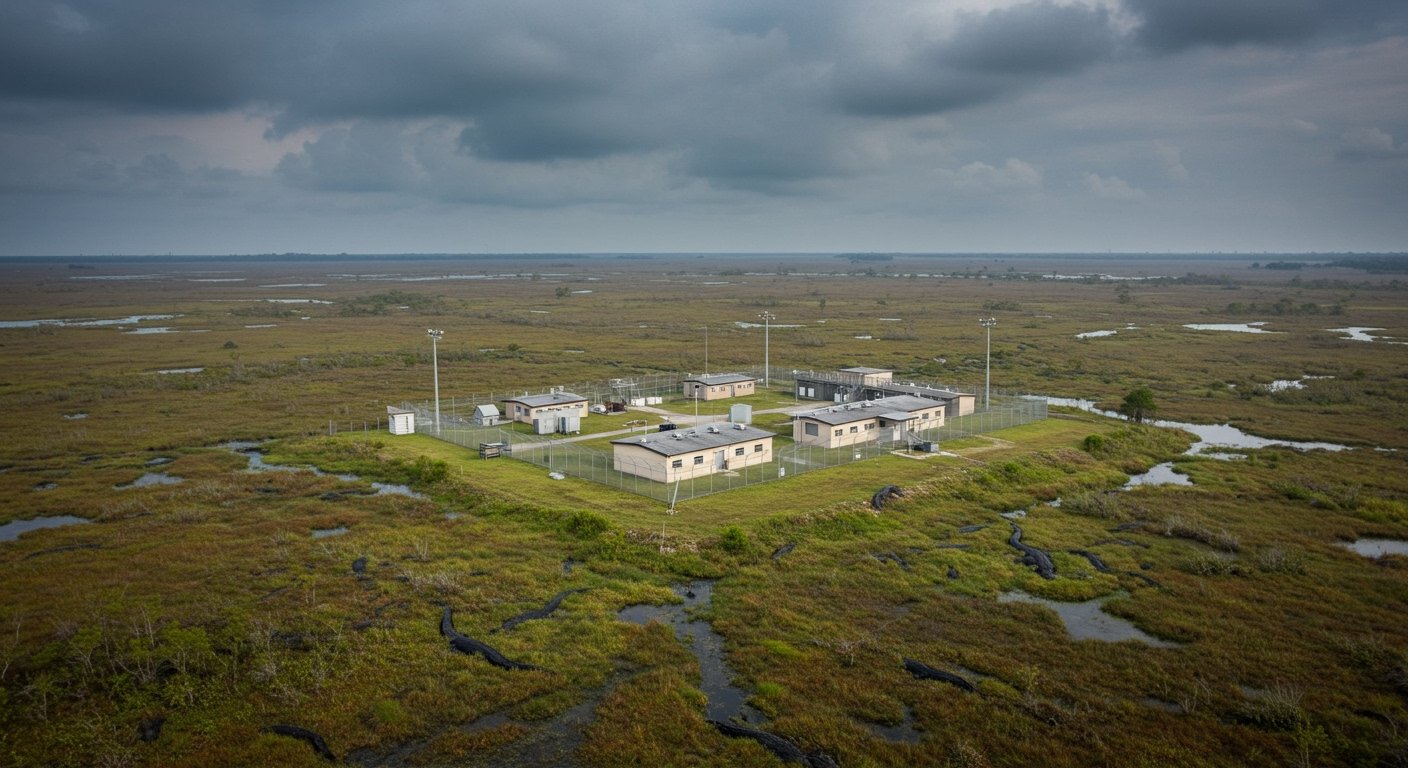SOUTH FLORIDA — A new and highly controversial immigration detention facility, located deep within the South Florida Everglades and already nicknamed “Alligator Alcatraz” by state officials, is scheduled to open its doors on Tuesday, July 1, 2025. The facility, situated at the Dade-Collier Training and Transition Airport on the very edge of Everglades National Park, is set to become a focal point of the ongoing national debate over immigration policy, particularly with the anticipated visit of President Trump.
Origins and Authorization of ‘Alligator Alcatraz’
The proposal for utilizing the remote Dade-Collier site as a migrant detention camp originated with Florida Attorney General James Uthmeier. Following this proposal, the Department of Homeland Security (DHS) granted authorization for the plan on June 20, clearing the way for the facility’s operation. A notable aspect of the DHS authorization is that it permits the detention of “illegal aliens” apprehended not only by federal Immigration and Customs Enforcement (ICE) agents but also by Florida state law enforcement personnel. This dual enforcement authority marks a significant expansion of the state’s role in immigration enforcement and detention.
The facility is positioned as a key component of a broader immigration crackdown initiated by Florida officials.
The Site and its Nickname
The location at the Dade-Collier Training and Transition Airport is particularly isolated, a factor contributing to its unofficial moniker. State officials have dubbed the remote camp “Alligator Alcatraz,” a name reflecting both its secluded nature, reminiscent of the infamous island prison, and its proximity to the alligator-inhabited wetlands of the Everglades. This nickname, while vivid, also underscores the facility’s controversial placement in an environmentally sensitive region adjacent to Everglades National Park.
Opposition and Environmental Concerns
The establishment of a detention facility in this location has not been without significant opposition. Environmental groups have voiced strong criticism, citing potential negative impacts on the fragile Everglades ecosystem and the integrity of the adjacent national park. Conservationists warn of the risks posed by increased human activity, waste management, and potential pollution in an area critical for biodiversity and water resources.
In addition to environmental concerns, the plan has also faced criticism from some Republicans within Miami-Dade County. While the specific reasons for this intra-party opposition vary, it highlights the complex political landscape surrounding immigration enforcement, even within conservative circles in South Florida.
Anticipated Presidential Visit
The opening of the facility is expected to coincide with a high-profile visit from President Trump. An alert issued by the Federal Aviation Administration (FAA) has indicated the potential for VIP movement at the controversial site on Tuesday, strongly suggesting a presidential arrival. The visit follows a public invitation extended to the President by Florida Governor Ron DeSantis.
President Trump’s presence at the facility’s apparent opening would undoubtedly draw significant national and international attention to the site and Florida’s immigration policies. It is expected to be framed by supporters as a firm stance on border security and enforcement, while critics are likely to use the platform to highlight the humanitarian and environmental concerns associated with the facility.
The timing of the visit, aligning with the scheduled opening date of July 1, 2025, emphasizes the political significance placed upon this new detention capacity.
Broader Context and Future
The Dade-Collier facility, or “Alligator Alcatraz” as it’s known to state officials, represents a tangible escalation in the efforts to detain and process individuals suspected of being in the country illegally within Florida’s borders. Its authorization allows state authorities an unprecedented level of involvement in post-apprehension detention, moving beyond traditional law enforcement roles.
As the facility prepares to open, the debates surrounding its location, purpose, and impact are set to intensify. The planned presidential visit further elevates the profile of this remote camp, ensuring that “Alligator Alcatraz” and the policies it represents will be closely scrutinized in the days and weeks following its commencement of operations.





